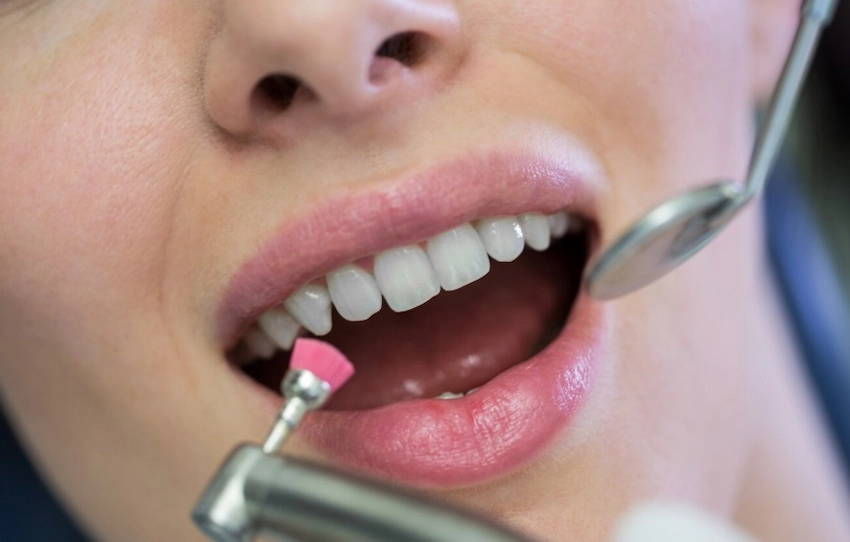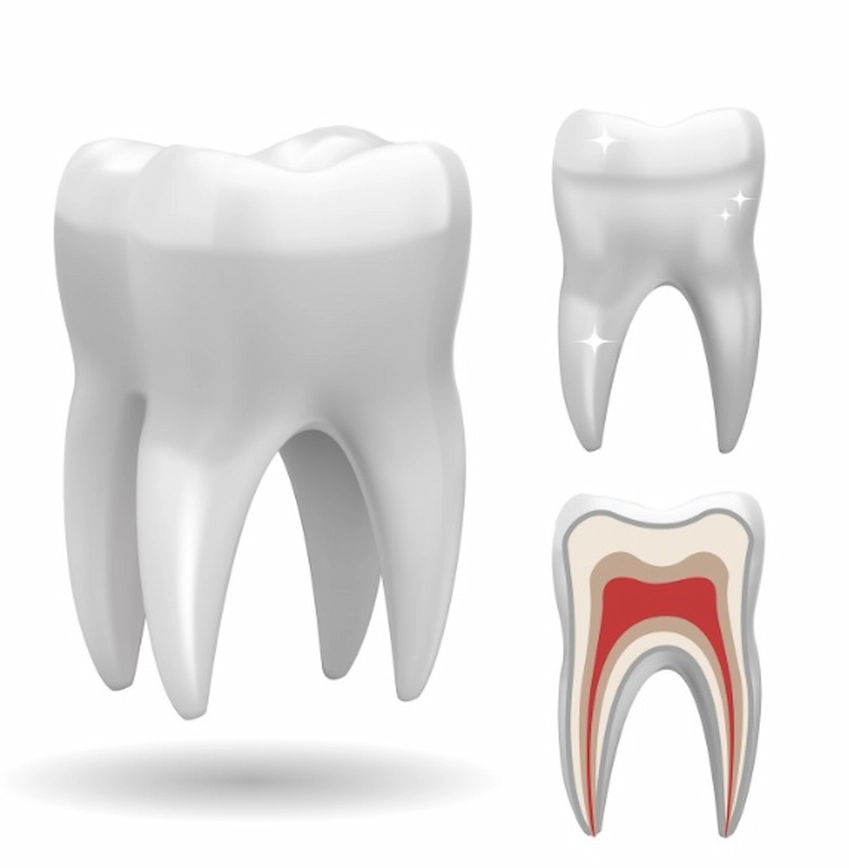🦷How to Restore Tooth Enamel for Better Dental Health?

Tooth enamel restoration is a vital aspect of maintaining dental health. This majestic outer coating of a tooth performs two main functions: it prevents the disruption of the inner structure of a tooth and guards the tooth from temperature variations. Sensitivity can arise while consuming food and drinks that are extremely hot, cold, or sweet, and if nothing is done, it can lead to further degradation of the enamel.
What is lost, however, cannot be retrieved, but thankfully, some effective measures can still be put in place to ensure the little enamel that remains is strengthened, thus averting any possible deterioration. This entails a combination of employing natural practices in conjunction with adequate oral care that could lead to an appreciable improvement in how one’s teeth look and the quality of one’s overall dental health, which boosts an individual’s confidence. This article examines these methods and lifelines for enhancing enamel protection and fortifying the existing one.
Understanding Tooth Enamel and Its Importance
The tooth enamel is a visible white hard layer of teeth that helps protect our teeth from decay, physical damage, and any external forces that may harm them. Good tooth enamel is important for maintaining general oral health, as it acts as a barrier against different causes of sensitivity and cavities in our teeth. Without a sufficient cover of enamel on teeth, chances of tooth damage are high, hence exposing the inner sensitive parts of the teeth, like the dentin or nerves. Consequently, the importance of tooth enamel cannot be ignored by those who wish to maintain healthy teeth as well as a bright smile.
What is Tooth Enamel? An overview of Tooth Enamel
Tooth enamel, an incredibly hard material, can be among the hardest of all tissues in the human body. Made up of about 95% minerals with some parts containing about 90% of calcium phosphates, with only 5% organic matter, enamel forms the outside layer of the teeth and manifests its properties of strength and durability. The strength and durability of enamel are such that it has been used by researchers to test different critical factors like load capacity and pressure resistance. Being translucent, the enamel also allows the natural color of the teeth to show through, revealing something about this layer that directly affects their cosmetic appeal.
What functions does dental enamel perform?
Several functions are in charge of maintaining good dental health, namely: separation of teeth from decay through a natural barrier mechanism, buffering against acidic substances in food or drinks, and providing insulation against temperature changes that we experience every time we eat hot or cold meals or suitable beverages. The soft layers found inside the tooth, such as dentin or pulp, become less protected when there is an insufficient amount of good material among these layers. Proceeding this way, an individual would experience problems while consuming foods or beverages; pulling or pain, especially with foods hot or cold; the general strength and aesthetic appeal, which rely on sound, healthy teeth, cannot be maintained either.
Is Tooth Enamel Capable of Repair?
The common belief that tooth enamel cannot restore itself like other workings of the body is true, but it can be strengthened by proper care and rehabilitation guides. Remineralization processes can enhance the functionality; changes in mentality toward using remineralizing toothpastes, fluoride supplements, or other products can help make sure we not only stop decaying our teeth but also bring back some lost strength. Consequently, organizing a healthy diet enriched with vitamins and minerals is essential for the remineralization of the outer layer of our teeth and making them as strong as a rock. Therefore, it is most beneficial that appropriate importance is placed on the care of any affected areas before they worsen or furthermore damage the outer layer of teeth.
What Are The Signs and Symptoms That Indicate Tooth Enamel Erosion?
Every person should have the ability to detect the symptoms of tooth enamel erosion in the earliest possible stages, because in that way it can be treated immediately. If the symptoms are identified at the early stage, it will help in eradicating the problem at the initial stages before it advances to severe situations that may involve a lot of funds that are used in the treatment of the same. Therefore, it is essential to achieve awareness about the symptoms of tooth enamel erosion so that one can be conscious of their teeth and take the necessary actions that can avert the probability of tooth loss.
Heightened Sensitivity of Teeth
Tooth sensitivity is a very common condition affecting innumerable people around the globe daily and is often a result of the gradual yet inevitable process of enamel erosion. In the case of enamel erosion, this outer surface of the tooth slowly wears away, exposing the inward structure of the tooth, the dentin, which is primarily a layer of hard connective tissue that can smoothly transmit sensations toward the nerve endings and tooth pulp. Due to its increase in permeability, dentin can send painful messages if the tooth comes into contact with hot, cold, or sweet stimuli. This inability to properly control the temperature and sugar levels in the mouth causes the patient constant discomfort and feelings of pain due to the interesting and irritating nature of food used or even the air breathed in.
Discoloration and Yellowing of Teeth
Enamel erosion is another condition that many people believe to be natural, but it can bring with it a set of problems, yellowing of the teeth being one of them. As the name implies, yellowing comprises a variation of the outer surface color of the tooth, enamel, becoming increasingly important, and revealing the yellowing underneath the dentin. In other words, the obvious thinning of the surface of the tooth makes the color of the dentin show through the enamel, thus making the teeth appear dull, yellowish, and pallid compared to their original appearance. In this way, a person may feel that they have been deprived of their entire youthful and beautiful image or that they have lost a part of themselves by not having the look of bright and white teeth that is so desired today.
Chips and Rough Edges on Teeth
Chipped and rough edges on the teeth are clear visual signs of existing enamel erosion that easily represent the fact of the patient’s neglect of his oral hygiene, or simply be the influence of mechanical factors such as periodontal disease. In the case of tooth enamel, the long process of eating away brings about irregular and jagged surfaces on its external tooth surface that are unattractive. These changes are not just unseemly but can also be detrimental since they may consist of segments wherein the structure of the teeth has been damaged to an extent that it gets uncomfortable and even painful to smile due to rough edges. It now becomes harder to find certain foods due to the teeth that are badly shaped.
- Chips and rough edges indicate increased susceptibility: Once the finely worn and shaped areas of the enamel develop more chips and defects, then the teeth as a whole can quickly become more vulnerable for a plethora of reasons. An already chipped tooth can even have smooth edges chipped.
- Dental problems: If dental wear is not contained there may occur more pronounced holes, holes, or other dental complications may occur that would only require a simple intervention for relief or even the extraction of a tooth. If this is not addressed early enough, the implications may go up to even becoming systemic, affecting adjoining teeth, other body parts, and the entire body system.
Understanding Enamel Erosion and Its Causes

Enamel erosion is the dissolving of the tooth surface away and this process can be caused by different factors, several which can excruciating pain and distress that the individual experiences upon teeth damaging and loss deficient to the very roots due to erosion. Knowledgeably recognizing the causes will be more effective in the development of the essential preventive mechanisms, the ones that are vital for everyone to retain and maintain the teeth, not only for themselves but also for the coming generations. Some agents can quicken the enamel decay continuum, the commonest of which are the consumption of acid-containing foods and drinks, and not following oral hygiene, rubbing or bruxism, gastroesophageal reflux disease, and the improper application of toothpaste and whitening products.
How Acidic Foods & Beverages Affect Tooth Enamel
Distribute acidic foods and drinks in your diet as little as you can so that you can keep your teeth safe from food acids. Acidic foods and beverages not only destroy oral tissues and wear off enamel but also, by the mechanism of the buffering capacity of saliva and alkali, decrease the pH of the dental plaque quite considerably. The erosion of the tooth enamel is due to consuming foods that are unbalanced and are at the end either in the acidic or alkaline list such as oranges and lemons from the very acidic side, and vegetables like tomatoes, cherries, potatoes, especially when they are taken in large amounts and from the alkalinity side they are the most dangerous while already harmful acid has exacerbated their erosion, the most alkali are capable of the erosion of the complicated in the removal of the dental plaque fluid. Drinking water after eating any of those acidic substances is really beneficial in terms of neutralizing the acids and thus effectively purging the mouth.
Risks Associated With Inadequate Oral Hygiene Practices
Poor and undisciplined oral hygiene creates a sequence of events that eventually result in the loss of tooth enamel. Individuals who do not brush and floss their teeth regularly are an ideal basis for the emergence of dental plaque, which is what sugars are necessary for the production of acids. One of the potential and continuous results of such adverse hygiene behavior is the abundant wear of enamel and the development of tooth sensitivity, decay, and finally, teeth falling out. Proper oral hygiene should always be maintained, such as teeth being brushed at least twice a day with fluoride toothpaste, flossing every day, and regular rinsing. Thus, the habitats for the teeth to swim in will be free from plaque a healthy oral environment will prevent further loss of enamel.
The Negative Impact of Tooth Grinding on Enamel Health
Bruxism or tooth grinding constitutes an excessive force application in the teeth, leading to the drop of teeth due to enamel wear. One of the common cases is when one is unconscious or stressed and does not notice. Such continuous happenings result in difficulty with teeth that have cracked or teeth with blunted edges. Bruxism can create different types of headaches and its causes are various; some can even lead to severe complications if no treatment is sought.
In addition to this, those related to bruxism have a wide range of treatment options designed to provide relaxation and prevention of bruxism, such as using mouthguards. Moreover, one may be required to see a dentist since the professional can suggest a look into stress reduction or a range of teeth grinding treatments that will be helpful in keeping the teeth’s enamel intact as long as possible. Again, one can directly take some steps to prevent the disease, for example, by using alcohol and drugs, which can lead to bruxism.
Understanding Acid With Teeth to Health, the Giveaway of Enamel Erosion Caused by Whitening Overuse
Using products of a similar nature more profusely than given in the instructions can lead to not only the original damage to tooth enamel but also to further damage that was not initially present. The majority of people might see that “teeth whitening off” products are a bit abrasive and have acid content, causing the scratching on the enamel’s surface, and hence, the frequent use may damage only the outer layer of the teeth (enamel). To get the teeth brighter without putting the enamel in a tough spot, it’s recommended to limit the number of times the products are applied only in the most essential cases, to allow a dentist’s recommendation, and to see if there is a secure way to make teeth white or at least less white than they were.
There are Various Natural Approaches for Enamel Regeneration and Its Strengthening
Learning to fix natural ways is like a store of memories that can help you undertake rebuilding and hardening of tooth enamel in a much less expensive way. These ways are generally about the care and maintenance of the body that allow natural remineralization to be a possibility while at the same time fighting off attacks on the teeth. Remineralization is a process that becomes more effective only when it is put in No more chances are left of the body to take in saliva, certain foods, and the practice of the mentioned activities as a natural way. By eating such foods regularly, the human body can be helped to use this method in restoring tooth enamel. The body can recover your enamel using the latter more quickly; that is how the technique works.
Understanding the Process of Remineralization
Remineralization refers to the reconstruction of the enamel structure by the deposition of important minerals inside. The good news of this positive event is that our mouth is always filled with saliva, which contains the necessary calcium, phosphorus, and fluoride that come from eating specific foods and constantly provides us with the nutrients required to develop our teeth. The other side of the coin signifies that the normally used old keywords are by no means getting out of the scope of the net at the moment, whereas the term remineralization suggests the idea of refilling the lost articulate of these two minerals in enamel with the aid of strong for remineralization that helps the tooth enamel to turn back to its original state.
Saliva is an Enamel’s Health Savior
The role of saliva in human body fitness and teeth’s health is innocent and crucial for the overall acquisition of health. It is very effective in eliminating the acids produced by the bacteria, which are the reason for tooth decay. This is not the only work of saliva. The presence of saliva also ensures that the saliva units fill the capacity of oral reactions. With more available saliva, enamel is better protected from the adverse effects of mechanical and chemical damage to it and hence the promotion of this mechanism becomes highly essential in maintaining the teeth totally.
Most Healthy Foods: Maintain Your Beautiful Smile with Enamel Support
The idea that tooth enamel can self-repair once good health issues are tackled and a person’s vitality is deeply rooted in their lifestyle is truly fascinating. The preference for calcium-containing foods like dairy, greens, nuts, and marine food in the current diet or as a regular serving provides the body with the nutritional floor that it requires. Advancement is in the future program by the introduction of such tooth-friendly food, which is an indication of considerable progress.
Avoiding Acidic and Sugary Foods
The preservation of tooth enamel through the strategy of avoiding citric and sugar products is of prime importance. Human teeth are covered with enamel, which is not only the hardest but also the most crucial substance in the oral cavity. Acidic food and drinks erode the enamel and, hence, cause loose teeth with time. More concretely, caries are known to be formed by the bacteria in the human mouth living on sugar supplied through food. Carious bacteria, which massively grow in the mouth, are found anywhere sweet things are eaten and the resulting acids are enough to start removing the minerals of the tooth, causing decay. Furthermore, the negative impact that sugar in food has on teeth is one of the many reasons for pain and discomfort to patients. It is clear that in accordance with the fact that avoiding acidic and sugary foods is a conservative mode of preserving one’s teeth.
Top-Notch Techniques for Tooth Enamel Restoration

For sure, one can consider some natural methods of restoring tooth enamel, but one may also want to seek professional treatments to help restore the integrity and form of tooth enamel, which, by the way, plays a very crucial role in oral health. A dentist, for instance, can offer a patient various dental procedures that can be used to strengthen and repair the outer layer of the respective tooth. Among the most recommended tricks which may be employed include using fluoride treatments, dental bonding, and veneers, to mention but a few. If well executed, these tricks can offer relevant solutions to people who suffer from tooth erosion caused by enamel loss, and by taking corrective actions, people may restore the strength and natural beauty of their teeth.
Fluoride Treatments with Long-Term Benefits
Among the professional treatment options, the fluoride treatments offered by dentists stand out as one of the most effective procedures in restoring tooth enamel. Fluoride, when applied as suggested, has the potential to react with the surface and the subsurface of tooth enamel to enhance its structural quality and thereby make the teeth more resistant to the risk of developing caries or cavities.
Generally, a trained dentist applies fluoride treatments in either gel or varnish form on the teeth, and a subsequent two-minute wait period will activate the fluoride varnish on the enamel. These sessions are fairly short, yet they offer cumulative fluoride treatment that can safeguard against any decay matters from chiseling away at the teeth and cause further damage. In the end, the treatment can produce long-lasting protection to the enamel layer, as this is what cannot be treated by any other confounding treatments, thus making it a progressively ideal choice for people who want greater protection against further instances of enamel wear.
Dental Bonding for Effective Enamel Restoration
Furthermore, dental bonding is a treatment that may be employed in order to fill in the gaps created when tooth enamel breaks down. This involves the application of a carefully designed and tooth-colored resin composite directly to the area to be restored and to give your tooth back its original shape or any functions that it should perform. The bonding technique involves a modification of the structure of the tooth, a technique used to bond and create any changes required, therefore suitable for checking the final result before it is integrated into the cavity.
This method is, therefore, an innovative procedure that is not only a simple exercise to execute, but also does not destroy existing teeth as, for instance, porcelain crowns. The corrective process is interactive and ongoing since it helps the dental office to allow for many patients, among whom there are some who do not need a highly invasive root canal treatment. The bonding will look the same as the other teeth within the mouth, and thus the confidence of resulting regarding the discolored or less solid teeth will increase without a doubt.
How do They Help with Enamel Erosion?
Veneers are ultra-thin shells that are used to cover the frontal part of the teeth in mention of aesthetic purposes. Secondly, they are considered a remedial solution to the problems of enamel erosion because they resemble porcelain as well as tooth enamel, thus having a look that appears natural. The fitting of these veneers is capable of literally restoring the way the patient’s teeth and smile look, hence their popularity as an option in the common cosmetic dental procedure.
Does Limiting Alcohol and Carbonated Drinks Have an Influence on Enamel Damage?
One essential thing that helps keep our dental structures, our teeth, healthy and intact, is limiting the use of alcoholic drinks and carbonated soft drinks. It should be noted that these drinks possess a highly acidic pH, which can dissolve the minerals that make the dental enamel strong over prolonged consumption. These include such flavored drinks as cola with phosphoric acid, citric acid, among others. When consumed in very high proportions, these drinks can damage tooth enamel, which may take years to heal since it is very exposed to risks. To prevent any issues of this kind, it is highly recommended that carbonated drinks be avoided at all costs, but if you cannot resist them, do so a little bit or at least rinse your mouth with water immediately after drinking them to reduce any effects.
FAQs About Restoring Tooth Enamel
Disseminating information on the frequently asked questions about rebuilding enamel not only provides a lot of knowledge but also makes people more sensitive. Most people often have questions about the time it takes to harden the enamel, whether it can be restored, and which toothpaste brands are most effective. Giving unambiguous explanations to these questions is a must for the communications industry
Strengthening tooth enamel takes time and varies based on individual habits. A proper oral care routine and nutrient-rich diet can accelerate the process. Typically, several weeks to months are needed to see improvements in enamel strength.
Tooth enamel does not grow back like other tissues. While it can be strengthened, the complete regeneration of lost enamel is impossible. Therefore, protecting existing enamel is crucial to ensuring long-term dental health and preventing further erosion.
The best toothpaste brands for enamel protection typically contain fluoride and essential minerals. Products like Sensodyne, Colgate, and Crest offer formulations specifically designed to strengthen enamel. These toothpastes effectively protect against decay and enhance oral health.
Lost tooth enamel cannot be completely rebuilt. While dental science offers methods to strengthen enamel, it does not fully regenerate. However, with proper care and professional treatments, it is possible to protect teeth and increase their lifespan effectively.
Fluoride is a crucial element for enamel repair and is necessary for improving tooth resistance. It helps remineralize weakened enamel and protect against decay. Therefore, using fluoride toothpaste and undergoing fluoride treatments is highly recommended for dental health.
Natural remedies can help strengthen tooth enamel, but they may not lead to complete regeneration. Certain foods and practices support enamel health. It’s important to combine natural methods with professional dental care for the best results
Proper hydration helps maintain saliva production, which is essential for neutralizing acids and remineralizing tooth enamel. Drinking plenty of water also rinses away food particles and harmful bacteria that can erode enamel over time.
Yes, dental crowns cover and protect weakened or damaged enamel by creating a strong, artificial surface. They prevent further decay and restore function while shielding the tooth from sensitivity and wear.
When enamel is completely worn away, the underlying dentin becomes exposed, leading to sensitivity, pain, and higher risk of decay. Unfortunately, enamel doesn’t regenerate, so treatment is needed to protect the tooth.
Tooth enamel loss is commonly caused by acidic foods and drinks, poor oral hygiene, acid reflux, and teeth grinding. Over time, these factors erode the enamel, making teeth more vulnerable to decay and sensitivity.




